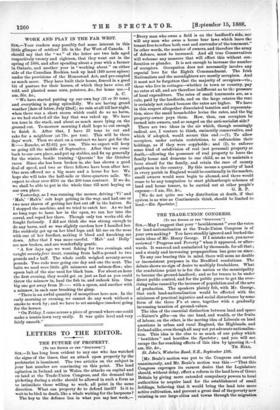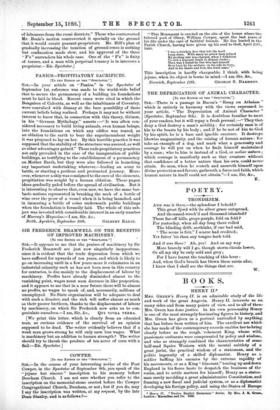THE TRADE-UNION CONGRESS.
[To TER EDITOR or TER "SPECTATOR."] SIR,—May I suggest that your " bewilderment " over the votes for land-nationalisation at the Trade-Union Congress is of your own making? You have steadily ignored and burked the main ideas of Mr. Henry George. If I mistake not, you never reviewed " Progress and Poverty" when it appeared, or after- wards. It was read and assimilated by thousands, for all that ;, and a steady and increasing propagandism has gone on since..
To any one bearing this in mind, there will seem no double or inconsistent purposes in the Bradford resolutions. The debate shows no sign of desire to multiply freeholders. What. the resolutions point to is for the nation or the municipality to become the ground-landlord; and so for tenure to be under direct public control, and for the public purse to get the ever- rising value caused by the increase of population and of the arts of production. The speakers plainly felt, with Mr. George, that such land-nationalisation would be effected with the. minimum of practical injustice and social disturbance by some form of the three F's at once, together with a gradually increasing taxation of ground-values.
The idea of the essential distinction between land and space- -Nature's gifts—on the one hand, and wealth, or the fruits. of labour, on the other, is the moving idea of Liberals on land questions in urban and rural England, the Highlands, and Ireland alike, even though all may not yet advocate nationalisa- tion. This idea is the clue to so much of our policy which " bewilders" and horrifies the Spectator; and you will not escape the far-reaching effects of this idea by ignoring it.—I.
am, Sir, &c., Tn. HILL. St. John's, Waterloo Road, S.E., September 13th.
[Mr. Beale's motion was put to the Congress and carried unanimously, and Mr. Beale's motion was this :—" That this Congress expresses its earnest desire that the Legislature should, without delay, effect a reform in the land laws of Great Britain by giving more extended compulsory powers to local authorities to acquire land for the establishment of small holdings, believing that it would bring the land into more active cultivation, and prevent a great deal of the poverty now existing in our large cities and towns through the migration of labourers from the rural districts." Those who controverted Mr. Beale's motion controverted it specially on the ground that it would create peasant-proprietors. Mr. Hill's plan of gradually increasing the taxation of ground-rents is nothing but confiscation made slow, and his approval of the three " F's" surrenders his whole case. One of the " F's" is fixity of tenure, and a man with perpetual tenancy is in interests a proprietor.—En. Spectator.]



































 Previous page
Previous page